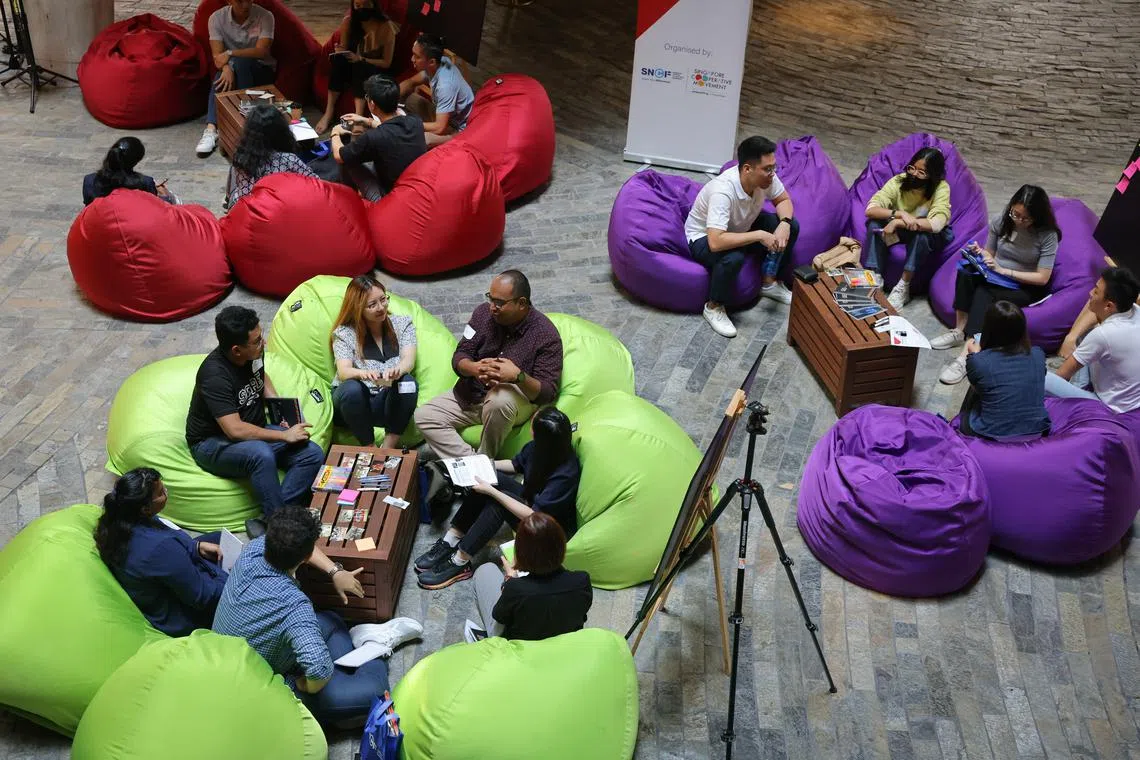Ministries outline plans for more inclusive Singapore, sustainable finances and access to justice
Sign up now: Get ST's newsletters delivered to your inbox

Students and cooperators at a Forward Singapore engagement session in January.
ST PHOTO: ONG WEE JIN
Follow topic:
SINGAPORE – Through the Forward Singapore exercise,
In his ministry’s addendum to the President’s Address that was delivered during the opening of Parliament
He said MCCY, together with the rest of Government, will offer opportunities for people to co-develop policies and solutions on salient national-level issues.
This will be done through platforms such as citizens’ panels, in which the community is involved in coming up with solutions to policy issues, as well as through Alliances for Action,
Mr Tong said MCCY’s mission is to “build a caring, cohesive, and confident nation, where everyone feels they belong and is inspired to work towards a common future”.
One way it will do so is through expanding common spaces, such as by growing the arts, heritage, and sports sectors and developing related facilities and programmes where people can come together.
With the Government taking over ownership of the Sports Hub
Schools also remain an important common space to develop cross-cultural understanding and friendships from an early age, he said.
As people come together, the different communities here can build a deep reserve of social capital and trust, he said, calling on people to nurture the “gotong royong” spirit. And amid demographic and society shifts, these bonds of trust must be continually reforged, he added.
To this end, MCCY will promote care for one another as an integral part of Singapore culture, and will continue to create opportunities for Singaporeans to donate or volunteer for causes they are passionate about, as well as facilitate mutual support across ethnic communities.
In an effort to promote pro-social behaviour and good neighbourliness, the Community Dispute Management Framework has been enhanced, he said, in a move that will allow people to resolve disputes amicably.
Mr Tong said that businesses, communities and individual Singaporeans all have a role to play in building a resilient society.
He noted that young Singaporeans, in particular, have shown a healthy and sustained interest in policymaking, and said his ministry will work with them to contribute to policies through platforms such as the Youth Circles, which allow youth leaders to engage government agencies on specific policy issues.
MCCY will also support the National Volunteer And Philanthropy Centre and the Singapore Business Federation to grow the number of businesses that generate value for society at large, among other things.
“Through the Forward Singapore engagements, Singaporeans have shared that they care about deepening inclusiveness, promoting fairness and growing a culture of giving back,” he said.
“MCCY will rally and support Singaporeans in achieving these ideals and aspirations, to build a stronger and better society.”
Harnessing fiscal resources prudently
On Friday, Deputy Prime Minister and Minister for Finance Lawrence Wong said his ministry will work with government agencies to deploy resources in support of Singapore’s national priorities, including initiatives being developed in the Forward Singapore exercise.
“We will allocate our resources in a prudent and responsible manner and continue to adjust our fiscal strategies to support the aspirations of present and future generations of Singaporeans,” he added in response to President Halimah Yacob’s address.
Singapore is now in a tighter fiscal space than before, he reiterated.
Amid growing healthcare and social expenditure to uplift lower-wage workers and strengthen early childhood education, among others, annual government spending is expected to increase to around 19 to 20 per cent of gross domestic product
Citing this, Mr Wong said the Ministry of Finance (MOF) has taken steps to ensure that rising government spending can be balanced by total revenue in the coming years, and has also enhanced the progressivity of the system of taxes and transfers.
But beyond what has been factored into these projections, the Government may need to spend more, for example, to enhance Singapore’s economic competitiveness, and this could require more revenue, or a reallocation of existing funds to the new priority areas, he added.
He said the MOF will continue to ensure sound and stable public finances through a sustainable mix of taxes on income, consumption and assets.
The ministry will also work closely with government agencies to ensure that government funds are spent effectively, he said.
This will be done through making sure that procurement is open and competitive, such as by improving access to procurement opportunities for small and medium enterprises, and through implementing structured frameworks to evaluate the effectiveness of programmes, he added.
The MOF will continue to publish the Singapore Public Sector Outcomes Review,
To support these efforts, the ministry itself will also press on with its digital transformation, including integrating budgeting, procurement and payment systems for better financial management and stepping up the use of data analytics to track how resources are used, said Mr Wong.
Digitalisation will also simplify processes and lower costs for businesses when they transact with the Government, such as when businesses submit invoices electronically through the InvoiceNow platform instead of manually, he added.
Mr Wong said: “MOF will harness our fiscal resources prudently and responsibly, working closely with government agencies and partners from the industry and community, so that we can move forward together with confidence and strength.”
Maintaining a high level of trust
As Singapore prepares to move into its next stage of nation building, it will also be important to maintain the high level of trust in the Government.
And a strong rule of law is a fundamental pillar of a trusted government, said Minister for Law and Home Affairs K. Shanmugam.
He said the Ministry of Law will press on with efforts to steward legal reforms to meet evolving societal needs, such as by becoming a party to the Hague Service Convention, which can help Singapore litigants with the service of judicial and extrajudicial documents in civil and commercial matters abroad.
The ministry will also uphold multilateralism and a rules-based international order by deepening engagements with international organisations, he added. Singapore recently joined the International Institute for the Unification of Private Law, a leading intergovernmental organisation that develops international treaties and standards in commercial law.
Steps have also been taken to improve access to justice, such as through establishing the Public Defender’s Office
Describing these moves as a significant milestone in the legal landscape, Mr Shanmugam said the Ministry of Law will continue to improve access to justice and legal services for all Singaporeans, such as by working with Pro Bono SG to set up a one-stop portal for the public to access legal information.
Through promoting Singapore as a legal services and intellectual property hub, the legal sector can also contribute to boosting the economy, he said.
Some of the initiatives by the ministry include encouraging foreign dispute resolution institutions to broaden and deepen their presence in Singapore and introducing a framework to standardise information about an enterprise’s intangible assets, such as technologies, brands and data, so that stakeholders can make more informed assessments of its business and financial prospects.
To arm the legal workforce with the skills needed, the Ministry of Law is working with the Law Society of Singapore to explore industry-wide secondment and exchange programmes to provide lawyers with opportunities to gain experience in growth domains and in key markets, among other things, added Mr Shanmugam.
The ministry will also enhance the Legal Technology Platform to integrate it with public systems to improve day-to-day workflow for lawyers.
MinLaw also manages state land under the Singapore Land Authority, and Mr Shanmugam said the ministry will continue to maximise the potential and unlock the value of state properties, to meet Singapore’s social and economic objectives.
For instance, it will partner with stakeholders, experts, and the public, on projects such as the rejuvenation of Gillman Barracks, Yarrow Gardens, and Dempsey, to harness innovative ideas and business models, he added.
“We will continue to engage our key stakeholders, strengthen the partnerships and trust built up over the years, and ensure that our policies remain relevant, to better realise our vision of ‘A Trusted Legal System; A Trusted Singapore’,” he said.


